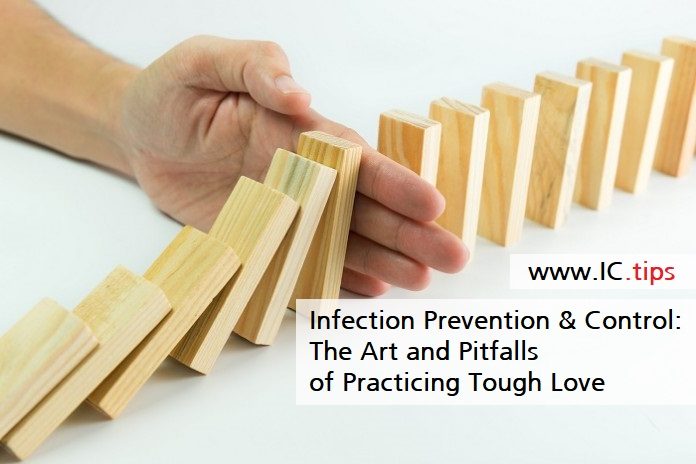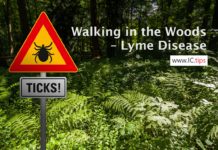Abstract
In any human relationship, tough love helps to prevent and control dysfunction. In our co-existence with microbes, we need to use a similar strategy to keep people safe from infection. But microbial tough love – also known as infection prevention and control – is not easy and may have several consequences. Thankfully, the work of infection preventionists continues to improve our chances for health. Working with them, we can all form a strong society to ensure this type of tough love is not only effective, but also enjoyable.
Main Article
Relationships are not easy and certainly not one-dimensional. They require an understanding of the entire ecosystem and an appreciation of individual strengths and weaknesses. A good relationship requires harmony but isn’t always focused on trying to keep the peace. When a respected or even loved one turns against society and becomes harmful, interventions may be needed to prevent and/or control the consequences of their actions. This is, in effect, tough love.
In the human context, tough love is hard. Preventing access to a certain environment requires restrictions that may be difficult to enforce. If a person has already crossed the line, means to control their actions pose even greater risks. Most infringers won’t take kindly to the measures and may resort to evasive procedures. Worse, some may become radicalized, transforming into even more dangerous versions of themselves. Then there is the trouble of the growing swell within a population. If people become swept up in a tidal wave, they may be difficult to find, let alone rehabilitate. The consequences go beyond the personal relationship and become a societal problem
The same concerns of tough love apply in another relationship many people don’t even realize they have. We are all engaged in a dynamic but continuous bond with the microbial world. They appear in all ecosystems, including our own bodies, and come in a variety of different types: bacteria, viruses, fungi, protozoa, and worms.
Most of the time, the relationship is inert; we live in mutual harmony. But some species have turned against us and are naturally pathogenic. To avoid infection, we need to ensure they are prevented from finding access to our portals of entry. If they do, we have to use control measures to ensure the damage is minimal and, hopefully, no sequelae occur afterwards. The strategies and actions are a necessary form of tough love to ensure our own health and in many cases, survival. We even have a name for this type of relationship preservation: infection prevention and control (IPC).
Pathogens are by far the most important reasons for tough love manifested as IPC. Yet in one specific environment, these infectious species are not the only troubles we face. Inside healthcare institutions, even the friendliest microscopic co-inhabitants can turn on us. It’s not due to a sudden alteration of microbial motive, however. Instead, it has to do with a change in the ecosystem in which one of two parts of the relationship have changed. In one case, a portal of entry has been offered allowing restricted access. In another, the natural strength of a human’s biological protective force – the immune system – has been compromised. For most infection preventionists, these two factors are the main drivers behind IPC.
At one time, the tough love was fairly easy to manifest. Cleaning, disinfection, handwashing, and proper treatment of infected individuals formed the perfect mix of protocols to reduce the spread of pathogens and keep a healthcare facility relatively safe. Yet, in the last few decades, the ecosystem changed.
We have seen a radicalization of certain bacteria in the form of antibiotic resistance. The rise of immunosuppressive pharmaceuticals has left a large segment of the population even more susceptible to disease. Then there is the issue of population density in which facilities are burdened with more patients and visitors than ever before. The dynamics have left IPC faced with new challenges and a need to develop novel tough love strategies.
The situation isn’t bleak, however, as thousands of passionate public health researchers are working across the globe to harness the power of tough love and apply it within our healthcare facilities. Some are as simple as finding a more efficient way to wash hands such as the introduction of alcohol based handrubs. Others are more detailed requiring a systems-wide approach such as antibiotic stewardship to reduce the spread of antimicrobial resistance. Then there are the behavioural studies all focusing on finding the right way to promote tough love and ensure it is kept positive, regardless of how arduous the tasks may be. As the knowledge base grows – and you will be able to find much of the information on this website – we will improve our ability to keep people safe and maintain a healthy relationship with microbes.
There is, however, one aspect to IPC no research can improve: it cannot be done alone. Much like the human version of tough love, those who practice need the support and the involvement of others to make it happen. After all, who has ever seen a one-person intervention of an addict or a singular person take on an entire population of rebels except perhaps in the movies? To ensure the best tough love against the pathogens and the friends-turned-foe, we need to work together as a unified team.
Societies and organizations are a good place to start but there is much to gain from the online environment. Whether you turn to Twitter, Facebook, Reddit or infectioncontrol.tips, you will be sure to find a group of like-minded individuals working to improve our healthcare environment. Not only will it offer support for your own tough love experience, you may also gain new insight into how you can make your IPC experience more effective. You may even find a few good friends for whom performing tough love won’t be dour, but convivial. With their involvement, you might even be able to turn a difficult part of our relationship with microbes into one that’s positive and even worth championing.












